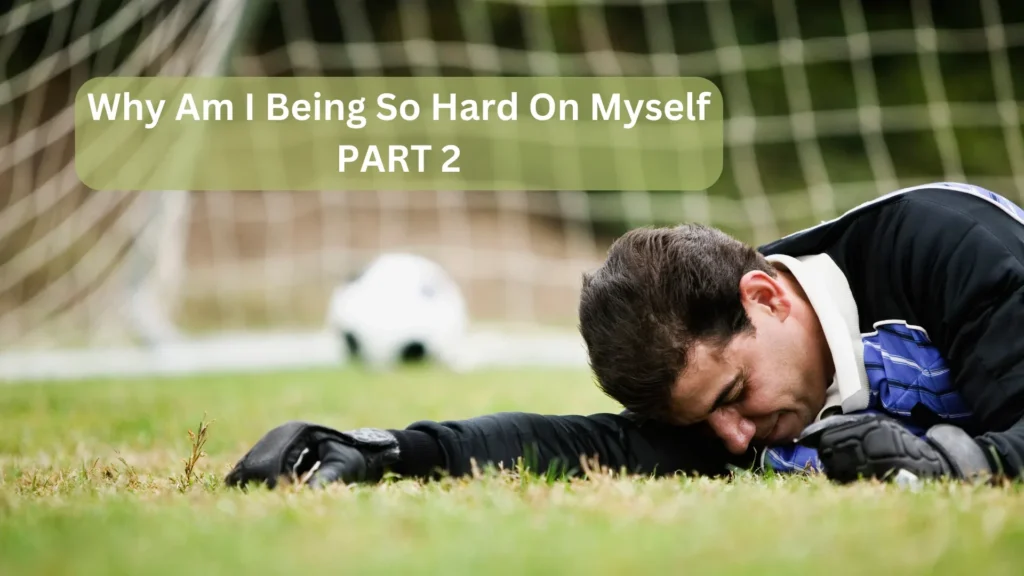Part 2: How to Reach High Performance Without Taking It Too Far

In Part 1 of “Why Am I Being So Hard On Myself?” we discovered the answer was because you care about what you are doing.
We then went on to encourage you not to evaluate your self-talk as good or bad, positive or negative.
Rather, look at the function of your thinking and decide if it was helping or hurting your performance.
In Part 2 below, we will elaborate on how you can be hard on yourself in a helpful way and how to reach high performance without taking it too far.
It Starts With the Heart
If you are going to be hard on yourself, it has to be done with a loving heart.
Science has shown over and over again that if we truly beat ourselves up with anger, contempt and/or shame that in the long run we will be worse off.
The harsh approach may motivate us in the immediate moment, but the benefits won’t last.
As an example, look at negative coaching.
If a coach yells at his players, calls them failures and demands that they be better he is likely to get some more energy and production out of them at that practice.
Players are motivated to avoid this verbal punishment.
Over the season, however, the verbal abuse loses its effectiveness. It creates fear, doubt and performance anxiety.
The anxiety becomes a distraction and kills motivation, both of which decrease performance.
And the harder the coach is on the players the more the relationship is ruined. Players start hating the coach.
The same dynamic plays out when we are too hard on ourselves. In other words, when we attack ourselves from this place of negativity.
So if you want to be hard on yourself and set a high standard, do so with some self-compassion.
- Start by being mindful and simply noticing what you are feeling and saying to yourself in the moment.
It might sound like this: “Wow, I’m really beating myself up here”, or “I’m having a really difficult time getting my work done”, or even “Wow, I’m really struggling to hit the ball in this game, I’m upset about it, and I’m calling myself some pretty colorful names!”
You get grounded in the present moment, out of the content of what you are saying, and simply notice that you are saying some harsh things to yourself.
- Step two is where you understand that self-criticism is normal and has a purpose.
You aren’t alone.
It might sound like this: “This is how people respond when they don’t meet their standard or expectation. Of course I am upset.”
It is from this objective place that you can choose your response to self-criticism.
- Step three is about responding to yourself with kindness so that it helps you move in the direction you want to go.
It might be with encouragement, such as “OK, you got this. Try again.”
It might be with a helpful reframe such as “Mistakes are a part of learning. I can grow from this.”
You might just need an emotional break after you beat yourself up, so you can take the sting out of it and talk to yourself like you would a friend and say, “It’s ok. May I be strong and patient right now.”
You could also continue to be hard on yourself if you do so with a kind and loving heart. It might sound something like this, “Let’s go! You’re better than this. You’ve worked hard and you’ve done this before. Get your head out of your @$$ and focus. C’mon!”
You will read in the last paragraph that the expectation remains high and the demand to be better is there.
At the same time, it is based on a positive belief in yourself (i.e., “You’re better than this”) and a belief that you can get it done (i.e., “worked hard … done this before”). It also includes a specific coaching action on how to be better (i.e., “focus”) and words of encouragement (i.e., “Let’s go! … C’mon!”).
In this way, self-criticism with self-compassion propels your forward toward your goals.
Without compassion, however, you are at risk of killing your motivation and increasing your distress.

A Special Word for Perfectionists
“Why am I being so hard on myself?” You might be a perfectionist.
Perfectionists tend to beat themselves up a lot.
As a recovering perfectionist, I know I did. It’s because we have such a high standard.
My perfectionists are very hesitant to stop being hard on themselves.
They come in and they wear self-criticism like a badge, proudly saying, “Nobody’s harder on me than I am!” like that’s a good thing.
And it might be.
We get something out of being hard on ourselves.
We validate our identity as perfectionsists, as having a high standard for ourselves.
When we criticize ourselves, we strengthen our conviction that we want to be better.
And that feels better in the immediate moment. It creates that coherence I spoke of in Part 1 when our actions match our beliefs about ourselves.
If I want to be perfect, I can’t tolerate mistakes. So to be hard on myself when I make them, makes sense.
Except that doesn’t work. While I may feel better in the moment through coherence, my performance usually suffers.
But here’s how you can do it properly.
Or better yet, PERFECTLY.
I’m going to teach you how to be the perfect perfectionist.
Start by changing your relationship with mistakes.
You have to understand that mistakes are a part of the process.
You might already know that, but you don’t have it in your heart.
When mistakes show up, instead of getting mad at yourself, and calling yourself names, saying “that’s unacceptable!” … address your mistake with the self-compassion taught above and learn from it.
I know “learning from your mistakes” is cliché, but let me ask you something. How many times have you actually learned from your mistakes?
Most of the time we don’t.
We just say: “Oh, I’m not going to do it again!” or “I’ll just try harder!”, and we move on and we make the same mistake again later.
We don’t dive in and examine what actually went wrong.
That takes humility.
It hurts our ego to look at where we failed. We’d rather just brush past it and be optimistic about doing better next time.
Imagine if you actually did learn something from every mistake you ever made, since you were say 10 years old.
Oh my! What a different life I would have lived! How many additional mistakes I would have avoided if I stopped and learned the first time!
Can you relate to this?
Appreciate the value of correcting your mistakes in service of growth and development. Learning from your mistakes is an essential part of the path toward perfection.
Again, they are not ok. They do cost you points and contribute to losses. You may be embarrassed when you make them and people will be disappointed.
We can’t change that.
How you react to them, however, is completely up to you.
You can be hard on yourself and beat yourself up and demand better. Or you can actually do something that moves you forward and learn from them.
Here’s what it might look like:
Let’s say you are golfing and just landed your tee shot into the middle of the lake.
You’re mad, frustrated and embarrassed. You have two choices.
You can engage with your emotions, act out, and curse yourself. That means that you can feel disappointed that you’ve hit this shot a bunch of times before and will “just do better” next time, trying to improve your confidence. You might say, “well it’s done, there’s nothing I can do about it. Onto the next shot.”
Or you can pause.
Embrace the frustration and use it to prompt you to ask, “Why did I do that? Was it an error in my grip or my back swing? Did I choose the wrong target? Was I not committed to the club I chose and swung with doubt and distraction? What specifically would I do differently to hit this shot well?”
And then use imagery to rehearse the correction. And only then move on to the next shot.
Which sounds better to you?
You Don’t Have to Be Positive
That’s right.
No pressure to stop being hard on yourself and turn it around and think positively.
If you are positive, and it works, then you’re ok. Keep it up.
And if you find that turning it around when you are negative and thinking more optimistically helps you, then that’s great. You can do that.
It’s all about what works. What is the result when I say, “X Y Z” to myself?
Let’s say, for example, after a workout that didn’t go well, you start telling yourself how weak you were today, how you are getting out of shape, how your opponents and teammates are so much better than you and you are either going to get your butt whipped when you compete this weekend or how you may not even get playing time because you suck so bad.
People may tell you to be positive. Remember all the work you put in. Remember that time you did so well. You wouldn’t be on the team if you didn’t deserve it.
And all that is true. But if you are thinking about all that and staying in your head, you aren’t focused on what really matters: your performance cues.
If you truly want to be better, you have to let go of all the evaluation, positive and negative, and focus on what you are doing.
Positive thinking can hurt performance.
Imagine you think you are awesome. You have great skills, you’re crushing your workouts. You can’t miss a shot.
There are two risks:
- Such positivity and overconfidence can take the edge off your effort. This is how upsets happen, when the team that’s supposed to lose beats the higher ranked team. Often overconfidence reduces the intensity of the performance due to the positive expectation of winning
- If you are still in your head, thinking about all these positive things, you aren’t in the game focused on what you need to be doing.
In both occasions your head isn’t where it needs to be to WIN.

Conclusion
So “why am I being so hard on myself?”
You’ve learned in Part 1 that it’s because you care and you learned the skill of noticing to protect yourself from the negative effects.
In this article you learned the importance of self-compassion to improve performance. We addressed perfectionism and established that you don’t need to replace criticism with positive thinking. It’s better to refocus on the action you need to take right in front of you.
This can be difficult to implement.
That’s why I created the Success Stories Community. A place where high-achievers like you can get the training and support you need to be your best when it matters most.
If you are being too hard on yourself, join us and learn how to use your self-talk to improve your performance rather than hurt it.



